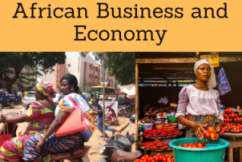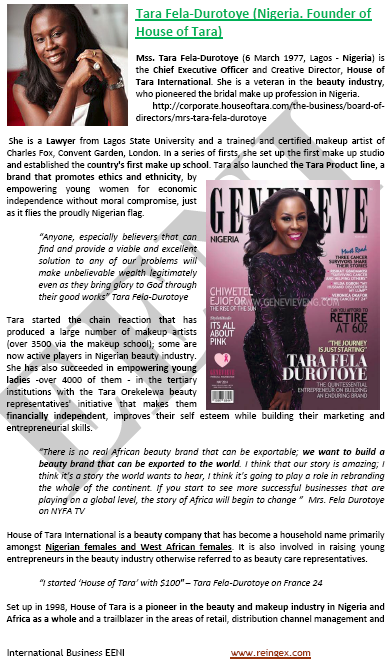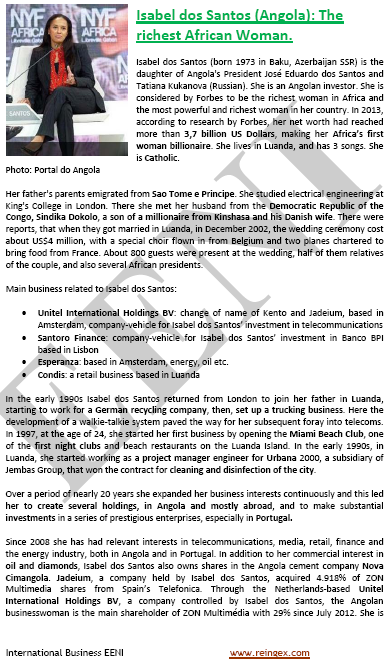
African Businesswoman, Presidents, Nobel Prize
African Gender Index. Isabel dos Santos (richest Women) Folorunsho Alakija
The Subject “African Businesswoman” consists of four themes:
1- African Centre for Gender.
- Introduction to the African Centre for Gender (ACG) of the Economic Commission for Africa (UNECA)
- African Women's Rights Observatory
- African Women's Report
- African Gender and Development Index (AGDI)
- Case Study: Nkosazana Dlamini-Zuma - former Chairperson of the African Union Commission
2- Women's rights in Africa.
- Introduction to Women's rights in Africa
- Protocol to the African Charter on Human and People's Rights on the Rights of Women in Africa
- Southern African Development Community on Gender and Development
- AUDA-NEPAD
- Solemn Declaration of the African Heads of States on Gender Equality
3- Top African Businesswoman.
- Isabel dos Santos (Angola): richest African Women
- Folorunsho Alakija (Nigeria)
- Cheryl Carolus (South Africa)
- Hajia Bola Shagaya (Nigeria)
- Divine Ndhlukula (Zimbabwe)
- Mimi Alemayehou (Ethiopia/US)
- Tara Fela-Durotoye (Nigeria)
- Minoush Abdel-Meguid (Egypt)
- Adenike Ogunlesi (Nigeria)
- Bridgette Radebe (South Africa)
- Sibongile Sambo (South Africa)
- Wendy Appelbaum (South Africa)
- Iman (Somalia)
- Amina Odidi (Nigeria - Canada)
- Rapelang Rabana (South Africa)
- Monica Katebe Musonda (Zambia)
- Amini Kajunju (Democratic Republic of the Congo)
- Folake Folarin-Coker (Nigeria)
- Irene Charnley (South Africa)
- Another influential businesswoman
4- African Women awarded the Nobel Prize, Head of State or Presidents.
- Wangari Maathai (Kenya)
- Ellen Johnson-Sirleaf (Former President of Liberia, Nobel Peace Prize)
- Leymah Gbowee (Liberia)
- Her Excellency, PhD Joyce Banda (Former President of Malawi)
- Catherine Samba-Panza (Interim President of the Central African Republic)

The Subject “African Businesswoman” belongs to the following Online Programs taught by EENI Global Business School:
Doctorate in African Business.
Master in Business in Africa, Transport in Africa.


EENI Partnerships with Educational Institutions
Languages:  or
or  Afrique Femmes Affaires
Afrique Femmes Affaires
 África Empresarias
África Empresarias  África Empresarias.
África Empresarias.
African Women (519 million) are the fundamental pillar of the African economic development. According to the OECD, the African Women represent 70% of the agriculture labour in Africa and generate 90% of the African food.
African Businesswoman.
The main objective of the ACG (African Centre for Gender) - Economic Commission for Africa - is to boost the African Women empowerment and reduce gender inequality.
The African Gender and Development Index elaborated by the Economic Commission for Africa consists of:
- Gender Status Index (quantitative)
- AWPS - African Women's Progress Scoreboard (qualitative)
The countries analyzed in the African Gender and Development Index are Benin, Burkina Faso, Cameroon, Egypt, Ethiopia, Ghana, Madagascar, Mozambique, South Africa, Tanzania, Tunisia, and Uganda.

Sample:

(c) EENI Global Business School (1995-2024)
We do not use cookies
Top of this page



